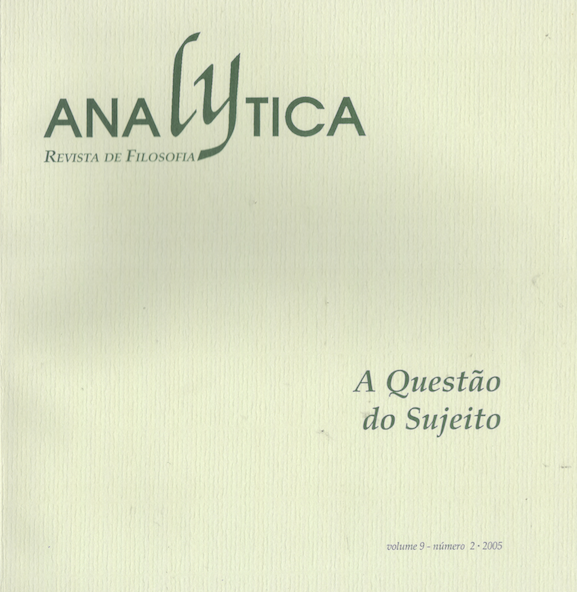Predicação, verdade e existência em Kant
Resumo
O objetivo deste texto é mostrar que a tese kantiana "a existência não é um predicado real" não pretende dever-se a qualquer "insight" quanto ao significado da palavra "existência". Ao invés disso, podemos supor que Kant pretende que, por "existente", compreende-se, independente de considerações filosóficas, algo como "ser algo que tem alguma realidade ou propriedade independentemente de ser pensado" e podemos mostrar que as peculiaridades no comportamento lógico da noção de existência são antes conseqüência da concepção kantiana sobre o que faz dos nossos pensamentos pensamentos verdadeiros: em última análise, é o que existe que torna verdadeiros nossos pensamentos.
Abstract
The purpose of this paper is to show that the kantian thesis "existence is not a real predicate" is not intended to be owed to any "insight" into the meaning of the word "existence". Rather, we can assume that Kant takes "existent" to have a meaning that is supposed to be independent of philosophical considerations -- simply that of "to be something that has some reality or property independent of being thought" -- and we could see the "logical behaviour" of the notion of existence as a consequence of Kant's view about what makes our thoughts true thoughts: existence cannot behave like real predicates because it is only what exists that, in the last resort, makes our thoughts true (or false).
Downloads
Downloads
Publicado
Como Citar
Edição
Seção
Licença
Os autores que publicam nesta revista concordam com os seguintes termos:
- Os autores mantêm os direitos autorais e concedem à revista o direito de primeira publicação, com o trabalho simultaneamente licenciado sob a Licença Creative Commons Atribuição-SemDerivações 4.0 Internacional (CC BY-ND 4.0), que permite a redistribuição, comercial ou não comercial, desde que a obra original não seja modificada e que seja atribuído o crédito ao autor.
- Os autores têm autorização para assumir contratos adicionais separadamente para distribuição não-exclusiva da versão do trabalho publicada nesta revista (ex.: publicar em repositório institucional ou como capítulo de livro), com reconhecimento de autoria e publicação inicial nesta revista.
- Os autores têm permissão e são estimulados a publicar e distribuir seu trabalho online (ex.: em repositórios institucionais ou na sua página pessoal) a qualquer ponto antes ou durante o processo editorial, já que isso pode gerar alterações produtivas, bem como aumentar o impacto e a citação do trabalho publicado (Veja O Efeito do Acesso Livre).


